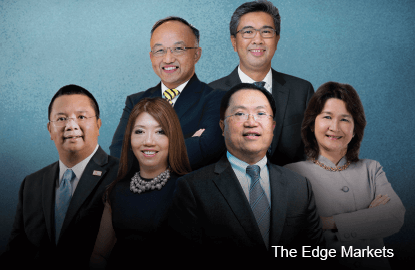

HONG LEONG INVESTMENT BANK (HLIB) managing director and CEO Lee Jim Leng does not see the group’s relatively small size in the industry as a drawback but rather as an advantage. “One of the differences between HLIB and some of the bigger bracket IBs (investment banks) is that we are niche and fairly nimble in terms of our cost,” she tells The Edge. “We have consciously not built an overly big team for years now. This is especially important to cater for a weak period of capital market activity.”
However, this doesn’t mean HLIB cannot execute what the big boys can. “In terms of products and services, we can do anything. The only thing in which we are limited is our global footprint — we don’t have one. So, we need to be realistic when we shape our strategies,” Lee acknowledges.
“We try to stay focused on what we do and promote stickiness with our clients. We are not hungry for market position. If we need to get three other banks to join in to give our client the best deal, we will do it. Because, ultimately, our philosophy is that we do not want our clients to, post-completion of a deal, hear our competitors telling them, ‘you did a lousy deal with HLIB’. The pricing and structure of deals are very transparent. It is very difficult to hide a deal that is badly priced or poorly executed,” adds the veteran investment banker.
Investment banks are slashing jobs and shutting down operations due to ballooning cost and declining earnings, but HLIB is not following suit, says Lee, adding that a voluntary separation scheme was undertaken by the Hong Leong group post its merger with EON Capital Bhd but HLIB only took over the investment banking asset of the merger post the VSS.
In terms of cost-to-income ratio, HLIB has one of the lowest in the industry at just below 60%. “We are comfortable currently. Our cost-to-income ratio includes bonus payout, which is flexible and tied to business levels, so we feel that our cost is fairly sustainable,” says Lee. “Having been an IB for the last 20 years, we know how cycles come and go. It is important to manage businesses based on the prediction of cycles, not on where we are now.”
HLIB became a full-fledged investment bank in 2009 upon the completion of its acquisition of Southern Investment Bank from CIMB group for RM48 million. The acquisition turned the Hong Leong group into a complete financial player. Nevertheless, following the buy, questions were raised as to whether a new and smallish investment banking player such as HLIB could make it in the viciously competitive game that is cornered by the big boys.
But HLIB proved to its critics that smallness doesn’t equal weakness and has seen its earnings grow over the years. The listed arm of the investment bank — Hong Leong Capital Bhd (HLCap) — has seen its net profit rise from RM14 million in FY2010 to RM119 million in FY2014 while return on equity climbed from 4.7% to 19.7%.
As IB earnings are volatile, having a stable flow of revenue is important, says Lee, which means diversifying the income base — something the group has done since it began as a retail broker and started strengthening its institutional portfolio.
Today, says Lee, HLIB is also trying to build its asset management business and private wealth segment. She admits that though the group is “acquisition ready”, it will not rush into something that doesn’t give it returns. “Our ROE (return on equity) today is in the mid to high teens, which is quite high. For some of the other IBs, it is in single digit. The question is, how do we remain nimble to create value for our shareholders? We want to look at earnings that are complementary.
“Of course, if an acquisition opportunity comes along, we will look at it. But it is not something we are hung up on. We won’t mind considering collaborations if we want to go into another country, if that makes sense. That is something I find more meaningful,” she adds.
She notes that expansion does not necessarily mean expanding the footprint; it could also mean innovating new products and income areas. “We expect much innovation from our talent pool,” she says, pointing out that the group has innovated many first-of-its-kind products for the market.
On HLCap’s public shareholding spread issue, Lee says the group will continue to explore options to address that. “There are no new developments at the moment.”
The public shareholding spread of HLCap — the listed parent of HLIB — stood at 18.67% as at March 31, 2015, below the 25% threshold. This became an issue after Hong Leong Financial Group Bhd (HLFG) launched an unconditional takeover of the company in January 2013 at RM1.71 per share. Only 2.21% of HLCap’s minority shareholders accepted the offer, raising HLFG’s interest in HLCap to 81.3%, but that was not enough for it to compulsorily acquire the remaining HLCap shares.
HLCap rose to close at RM10.20 before it was suspended on March 26.
This article first appeared in The Edge Malaysia Weekly, on June 29 - July 5, 2015.
Save by subscribing to us for your print and/or digital copy.
P/S: The Edge is also available on Apple's AppStore and Androids' Google Play.